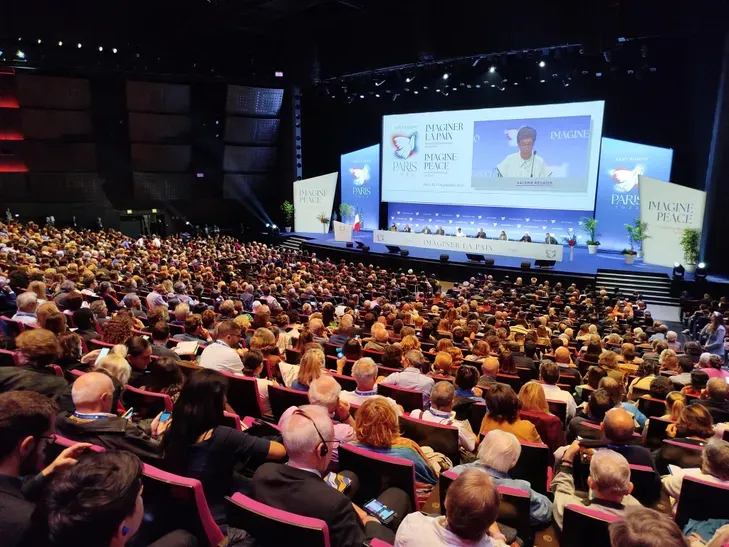More than 150 religious and political leaders from diverse backgrounds convened in Paris for Sant’Egidio’s International Meetings for Peace, fostering dialogue across divides. With a theme of “Imagining Peace,” the event emphasized cultural exchange, interfaith cooperation, and a collective resistance to global violence.
An Orthodox rabbi sitting next to an Al-Azhar professor, a Christian from Iraq, an Iranian Muslim theologian, a Vatican representative, and the president of France’s Protestant Federation—Sant’Egidio has a unique ability to unite personalities from vastly different backgrounds. More than 150 leaders from politics, civil society, and all major world religions are in Paris for the “International Meetings for Peace” from September 22 to 24.
“To make peace, you have to talk to those who wage war,” explained Valérie Régnier, head of the Sant’Egidio community in France, who takes pride in bringing together people with strongly opposing views. She believes it is crucial to create spaces where people can set aside their grievances.
“Peace is a worksite open to all”
It all began in 1986 when St. John Paul II first gathered representatives of major religious traditions in Assisi to pray for peace. Sant’Egidio was tasked with working alongside Muslim representatives. At the end of that meeting, the pope proclaimed: “Peace is a worksite open to all.” “We took that call very seriously,” recalled Régnier. Since then, Sant’Egidio has gathered not only religious leaders but also politicians, researchers, and many members of civil society.
How has Sant’Egidio achieved such success? “They have the ear of the Vatican and an incredible network of contacts,” said Isabelle de Gaulmyn, former editor-in-chief of La Croix. Now serving as president of France’s Social Weeks, she has participated in these meetings several times and praised their ability to bring together people who would never normally meet. “What matters most are the long-term connections that are made,” she adds, calling it a form of “Christian soft power.”
A focus on culture
“From the start, we envisioned these meetings as a pilgrimage, with stops in different cities,” Régnier explained. Every year has a global dimension and a “local flavor.” This time, Paris is the host, placing a strong emphasis on culture, with Amin Maalouf, the permanent secretary of the French Academy, participating in the opening session, as well as French President Emmanuel Macron.
This year’s theme, “Imagining Peace,” might seem like an admission of powerlessness in the face of increasing violence and conflict. However, Régnier dismissed the notion, insisting: “Every day, we face violence, whether in war-torn countries where Sant’Egidio is active or in large cities like Paris.” In a world saturated with images of war, she believed it was essential to make peace desirable again and to use imagination as a tool for action.
Just two weeks after the previous meeting in Berlin, the Hamas terrorist attack occurred on October 7, 2023. “What’s the point?” some may have wondered. Régnier stressed the importance of not giving in to resignation, viewing the gatherings as “acts of resistance to war.” “I believe in the underground power of prayer and in the commitment of each person,” she said, echoing the three pillars of Sant’Egidio’s work: prayer, the poor, and peace, which have guided the community since its founding in 1968.
Interfaith cooperation, with joint prayer sessions and a concluding message from Pope Francis, lies at the heart of these meetings. “It’s a way of embracing humanity in its entirety, especially its spiritual dimension,” notes Gaulmyn. This is a bold move in a secular country like France, where religion is often viewed negatively and relegated to the private sphere. That’s why, she added, “it’s important to keep reiterating that religions are a crucial factor for peace in society today.”
Be creative in thinking about the peace of tomorrow
In a world where “war is returning on an unprecedented scale,” Macron stressed the urgent need for imagination. He called for increased creativity in the face of nostalgia and identity obsession, what he described as a “copyist’s attitude.” He went on to highlight the bold, almost utopian steps taken to build Europe after World War II and the Holocaust. “It took imaginative people to conceive European peace. We need to be just as imaginative to think about peace for tomorrow.”
His humanist speech, with philosophical undertones, occasionally turned more political. Referring to the situation in the Middle East, Macron expressed a hope for “a place, a land, a state, coexistence, and the recognition of everyone's right to live in peace.” He also advocated for “a new international order” and called for a reevaluation of relations with Russia after the war in Ukraine, promising to address the topic further at the United Nations later in the week.
While Macron didn’t make frequent references to religion, he did praise its “fundamental and very concrete role” in “rehumanizing” society, emphasizing how “France is honored to support this, particularly in the Middle East.” In a country that holds secularism dear, the mere presence of the French president at an interfaith summit spoke volumes.
Among the other speakers were Archbishop Laurent Ulrich of Paris, Anglican Archbishop Justin Welby of Canterbury, Paris Mayor Anne Hidalgo, France’s Chief Rabbi Haïm Korsia, Lina Hassani—a refugee from Afghanistan aided by a Sant'Egidio humanitarian program—along with a representative of Chems-Eddine Hafiz, Rector of the Grand Mosque of Paris, and Amin Maalouf, the permanent secretary of the French Academy.
[ Gonzague de Pontac ]














